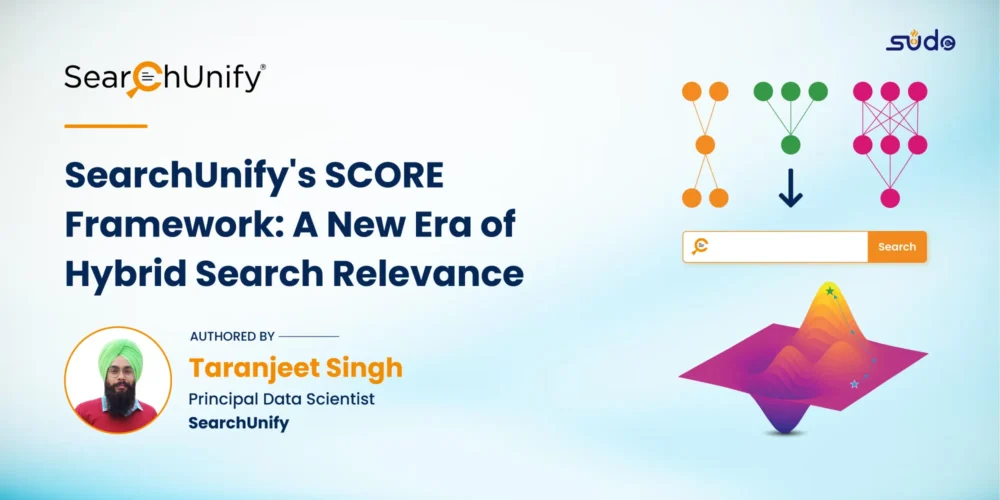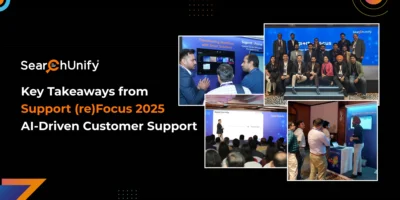
For years, the search community has grappled with the limitations of traditional search technologies. While keyword-based search offered precision, it often missed the nuances of human language, leading to frustrating “zero results” pages. On the other hand, pure semantic search, while adept at understanding context, often struggled to deliver the pin-point accuracy users desired.
Here at SearchUnify, we believe we’ve cracked the code for a superior search experience with our new Contextual Relevance Engine (SCORE) Framework. SCORE signifies a fundamental shift in how we approach search, moving beyond the limitations of simple keyword matching to embrace the richness and complexity of human language.
Problem: Traditional Search Limitations
Before we delve into the intricacies of SCORE, let’s take a moment to understand the challenges we aimed to solve:
- Keyword Search: Precise, Yet Limited: Keyword-based search excels at finding exact matches, but it often falls short when faced with synonyms, variations in phrasing, or the need to understand the user’s intent. This leads to low recall, where relevant documents are missed simply because they don’t contain the specific keywords used in the query.
- Semantic Search: Intelligent, But Imprecise: Semantic search, with its ability to understand the meaning behind words, holds immense promise. However, it can often struggle to deliver pin-point accuracy, returning semantically related documents that, while topically similar, don’t directly address the user’s needs.
SCORE: A New Paradigm for Hybrid Search Relevance
SCORE transcends these limitations by intelligently combining the strengths of both keyword-based and semantic search. Here’s how:
1. Intelligent Reranking: Surfacing the Hidden Gems
SCORE goes beyond simply retrieving the top-K results based on initial relevance scores. Instead, it employs a sophisticated reranking algorithm that analyzes all retrieved documents and assigns a semantic similarity score based on their relationship to the user’s query.
Think of it like this: instead of just looking at the first page of search results, we’re intelligently scanning all the pages, identifying those hidden gems that might not have ranked highly based on keywords alone but are semantically very relevant to the user’s intent.
2. Semantic Tuning Model: Personalization Through Data
SCORE leverages a powerful semantic tuning model that continuously learns and adapts based on both customer-specific data and aggregated usage patterns. This model considers a variety of factors to fine-tune search relevance, including:
- Keywords: Analyzing variations in keyword usage and synonyms.
- Content Sources: Understanding the relevance of different content repositories to specific user groups.
- User Behavior: Learning from past searches, clicks, and dwell times to predict future needs.
- Feedback Mechanisms: Incorporating explicit user feedback, such as ratings, likes, and “solved” markers in community forums.

3. Flexible Semantic Ratio Control: Your Search, Your Way
We understand that every search application is unique. That’s why SCORE provides administrators with granular control over the balance between keyword-based and semantic search algorithms. This flexibility allows for the creation of dynamic search experiences that adapt to:
- Specific Content Types: Prioritize keyword precision for highly structured content like technical documentation, while leaning towards semantic understanding for knowledge base articles that aim to solve complex problems.
- User Expertise Levels: Surface more precise results for novice users who might benefit from exact keyword matches, while offering more semantically broad results for experts who can better navigate nuanced information.
4. Holistic Engineering: Optimized for Performance at Scale
SCORE isn’t just a layer on top of existing search infrastructure. It represents a holistic engineering approach where every stage of the search pipeline—from indexing and segmenting to query processing and result ranking—is optimized for maximum relevance and performance.
We’ve designed SCORE’s architecture to seamlessly scale to handle the demands of modern enterprises, ensuring a consistently responsive and accurate search experience even with massive datasets and high query volumes.
5. LLMs: The Power of Generative AI
SCORE leverages the immense power of Large Language Models (LLMs) to enhance both retrieval accuracy and the user experience:
- Query Expansion: LLMs help us generate semantically rich query expansions, capturing a wider range of relevant content and improving recall for complex queries.
- Related Concepts: LLMs can identify and surface related concepts not explicitly mentioned in the user’s query, leading to serendipitous discovery and a deeper understanding of the subject matter.
We’ve incorporated a robust evaluation and iteration framework to select and fine-tune the most suitable LLM tools for specific use cases, ensuring optimal performance and relevance.
SCORE: Delivering Tangible Benefits for Businesses
The benefits of SCORE extend far beyond technical improvements. It empowers businesses to:
- Enhance Search Precision: Surface highly relevant results, even for complex, nuanced, or ambiguous queries.
- Improve Content Findability: Help users find the information they need quickly and effortlessly, reducing search frustration and increasing productivity.
- Personalize Search Experiences: Deliver tailored results that align with individual user needs, preferences, and search history.
- Gain Data-Driven Insights: Understand how users interact with their content, revealing valuable insights that can be used to optimize content strategy, knowledge management practices, and overall user experience.
SearchUnify’s Approach to Neural Search with SCORE: Outperforming the Competition in Relevance & Control
| Feature | SearchUnify Hybrid Search (with SCORE) | Pure Neural/Vector Search | Other Enterprise Search Platform | Basic Keyword Search |
|---|---|---|---|---|
| Search Precision | Combines keyword precision with semantic understanding to deliver highly accurate results. | Prone to lower precision, especially with unfamiliar terms or complex queries. May retrieve semantically similar but irrelevant results. | Often prioritize AI-powered features, which may lead to inconsistent precision, especially in niche domains. | Highly precise for exact matches but fails to capture semantic relationships, synonyms, or variations in phrasing. |
| Search Recall | Expands recall beyond exact keyword matches, capturing relevant content through synonyms and contextual understanding. | Can miss relevant results lacking strong semantic connections to the query, even if keywords match. | Strive for broad recall but can be complex to fine-tune for specific content types and user needs. | Limited to exact keyword matches, resulting in low recall and a higher chance of missing relevant information. |
| Data Requirements | Functions effectively with diverse datasets, leveraging metadata when available while accommodating content without rich semantic information. | Reliant on high-quality, semantically rich data and metadata. Performance may degrade with sparse or inconsistent data. | Typically require extensive data ingestion and configuration for optimal performance. | Can handle varied data, but recall and relevance suffer without robust indexing and metadata strategies. |
| Handling Complexity | Excels at handling complex queries, long-tail searches, and searches involving typos or variations in phrasing. | May struggle with nuanced queries or those requiring deep domain knowledge where semantic relationships are not easily captured. | Designed to handle enterprise-scale complexity, but implementation and customization can be resource-intensive. | Struggles with complex queries and linguistic variations, leading to poor results for anything beyond simple keyword matching. |
| Control & Transparency | SCORE framework allows for adjustable weighting of keyword and vector search scores, giving control over the balance between precision and recall. | Offers limited control over the search process and may lack transparency, making it difficult to understand and fine-tune results. | Offer powerful features but may lack granular control over search algorithms and relevance ranking for specific use cases. | Offers limited control beyond basic relevance ranking parameters. Fine-tuning for specific use cases is challenging. |
| Cost-Effectiveness | Provides a balanced approach, optimizing resource utilization by combining the strengths of both search methods. | Can be computationally expensive, particularly for large datasets and complex models, potentially impacting scalability and cost. | Often involve higher upfront costs and ongoing subscription fees, making them a significant investment. | Generally cost-effective, but may require significant engineering effort to improve relevance and recall, especially at scale. |
Ready to experience the future of search? Request a demo today and see how SCORE can transform your search experience.










